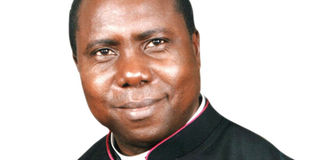The church is ecumenical by nature

John Wynand Katende
“One of the benefits of religion is unity. The communal practice of religion in a house of worship brings people together and allows them to interact and communicate. In this way religion helps reinforce social unity and stability”, observes Émile Durkheim, a French sociologist.
October 11, 2022 marks the 60th anniversary since Pope St. John XXIII solemnly opened the Second Vatican Council. One of the key goals of the Council was the re-establishment of visible unity among Christians- ecumenism. More than 100 delegated observers or ecumenical guests from other churches, attended.
According to the Catholic Church, a Church Council is ecumenical (“world-wide”), if it is “a solemn congregation of the Catholic bishops of the world at the invitation of the Pope to decide on matters of the Church with him. Pope Pius IX invited non-Catholics to attend the First Vatican Council (1869-1870), to abandon their errors and embrace the Catholic Faith. But Vatican II emphasised ecumenism as religious fellowship.
During the council, a Secretariat for Promoting Christian Unity, later named the Pontifical Council for Promoting Christian Unity (PCPCU), was established as one of the organs of the Catholic Church. Its objective was to restore unity among Christians and interfaith dialogue with non-Christian religions, by engaging in timely ecumenical initiatives and activities, both within the Catholic Church and in relations with other churches and ecclesial communities.
Long before Vatican II, a Protestant movement toward Christian unity, had been founded by the Edinburgh World Missionary Conference in 1910. In 1948, another Christian inter-church organisation, called World Council of Churches (WCC), was founded to work for the cause of ecumenism. PCPCU has been engaging with WCC.
In January, 1965, a joint working group between the Catholic church and WCC was formed and has continued to work for the benefit of the work of Christian unity. There is joint preparation of the texts for the week of prayer for Christian Unity, a fruitful collaboration on the Commission on world mission and evangelism and the office for inter-religious dialogue and cooperation.
A theological commission, comprising orthodox, Anglican, Protestant, Evangelical, Pentecostal and Catholic theologians was instituted to address doctrinal divergences. Topics include Holy Scripture and Tradition, Apostolic faith, anthropology, youth, hermeneutics, reconciliation, peace, migrants and refugees, preservation of creation, and visible unity.
The Catholic Church, however, does not seek membership of WCC, partly because of the disparities between her structure and size, and partly because of its theological self-understanding as universal fellowship with a universal mission and structure. From this perspective the Bishop of Rome cannot be considered as one among many heads of churches, but as the point of reference of the unity of all the baptized. During the 2022 Lambeth Conference, Archbishop Justin Welby of Canterbury expressed that the majority of the Church of England’s members acknowledge the pope to be “the father of the Church in the West.”
Among special moments in the history of the relations between the Catholic Church and the WCC, were visits of Popes St. John Paul II and Benedict XVI to the Ecumenical Centre in Geneva. On 21 June 2018, Pope Francis visited the Centre to commemorate the 70th anniversary of the foundation of WCC, which visit he referred to as an “ecumenical pilgrimage”. Reflecting on the theme of the celebrations: “Walking, Praying, Working Together”, the Pope encouraged all Christians to “pray, evangelise and serve together.
Commenting on the 60th anniversary, Fr. Avelino González-Ferrer, member of PCPCU, says that the Christian community has gone “from conflict to communion”. “There is a purification of memory in coming together to hear each other’s different perspectives and that purification of memory leads to a reconciliation and that reconciliation is the bridge to unity. That’s what the Gospel teaches us.” But he also comments that the vision of visible communion seems to be elusive.
In his encyclical Ut unum sint (that they may be one), St John Paul II says that the Catholic Church is ecumenical by nature. St. Paul in Ephesians 4:3-6, emphasises that ecumenism is based on the Trinity. We continue to pray with Jesus for unity of His Church (John 17:21-23).
Msgr. John Wynand Katende, [email protected]





